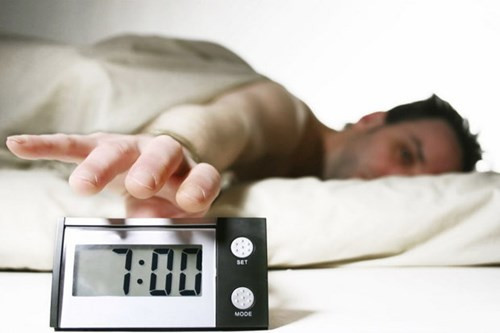How to sleep to stay young?
Getting enough sleep, 7-9 hours a day, helps the body quickly regenerate energy and recover from damage caused by exposure to environmental toxins.
Getting enough sleep, 7-9 hours a day, helps the body quickly regenerate energy and recover from damage caused by exposure to environmental toxins, UV rays and other harmful agents during the day.
 |
| Illustration photo. |
Lack of sleep manifests itself in dark circles around the eyes, dry and dull skin and uneven skin tone... which are signs of progressive skin aging. When we get enough sleep, sleep properly not only helps us have beautiful skin but also refreshes our mind and rejuvenates our body.
The importance of sleep
According to statistics, each of us spends about 1/3 of our lives sleeping. Sleep is a natural unconscious state, in which brain activity is not clearly seen, in addition to continuing to maintain basic body functions such as breathing, circulation...
Sleep is a highly synchronized state that enhances the growth and rejuvenation of the immune, nervous, skeletal and muscular systems. Sleep helps the body replenish energy after a long day of consumption.
In addition, sleep is also the time when the body regenerates and recovers itself. Growth hormone is also secreted during sleep, and it also stimulates tissue regeneration in adults. The trend is increasingly growing, in addition to work pressure, causing our bodies to consume a lot of energy every day.
Sleeping too little not only makes the body tired but also increases the hormone cortisol - a hormone that increases inflammation caused by acne and can cause premature wrinkles, dark circles, eye bags, and skin aging. Sleeping too much also becomes dangerous, leading to cardiovascular diseases and obesity... But how to sleep to benefit and slow down the aging process as well as increase longevity.
Don't sleep too much
Sleeping too much increases the risk of cardiovascular diseases: When we are awake, our body moves, the heart muscles have to contract more strongly, the heart's blood circulation increases rapidly. When we sleep, the heart rate and muscle contractions decrease, reducing the blood exchange process to the heart, so that is the cause of cardiovascular diseases.
 |
| 7am is a good time to start breakfast. |
Sleeping too much damages and causes respiratory diseases: When you sleep too much in the morning, while the morning in the room is quite polluted, contains a lot of bacteria and CO2 gas, it is very easy to damage and cause respiratory diseases such as sore throat, cough, flu... In addition, sleeping too much makes your body stagnant, less active and less metabolic, so the lungs are also "lazy" to work, which will lead to disadvantages for the respiratory tract.
Sleeping too much makes you lose focus, work less effectively, and reduces memory: Because sleeping too much, the body consumes a lot of oxygen, the brain tissue temporarily lacks nutrition, the body will lose hormone balance, causing a feeling of fatigue, drowsiness, heaviness in the head and lack of vitality, difficulty concentrating. The body is lethargic due to sleeping late in the morning, causing the muscles to not relax, blood circulation, your limbs are also numb, the body is sore and uncomfortable.
Sleeping too much causes loss of appetite: Fatigue and headaches are the main causes of loss of appetite.
Overweight and obesity due to sleeping too much: When you take in energy from food and nutrients but do not use them for activities, the result is that the energy and nutrients will accumulate into excess fat in the body, causing overweight and obesity.
Increased risk of diabetes: Sleeping too much or not enough each night can increase the risk of diabetes due to impaired insulin metabolism in the body.
Disadvantages of sleeping too little
Lack of sleep will directly affect your skin. Lack of sleep causes the body to not produce growth hormone, which in turn creates cortisol, a stress hormone that has been found to break down a lot of collagen in the body.
Memory loss: Lack of sleep is a cause of decreased brain activity, causing a protein that causes memory loss to gradually accumulate in the brain. High levels of this beta-amyloid protein will disrupt sleep, creating a toxic process that results in Alzheimer's disease, memory loss.
Cardiovascular diseases: When you lack sleep, your sympathetic nervous system becomes more active, your blood vessels constrict, your blood pressure increases, putting more pressure on your heart. Furthermore, when you sleep less, your body needs more insulin to maintain normal blood sugar levels, which has a negative impact on your blood vessels and heart.
Overweight and obesity: When you lack sleep, insomnia will make your body always tired and stressed, leading to poor functioning of organs in the body and unable to burn calories, excess fat accumulates, many people stay up late, have difficulty sleeping, little exercise and have the habit of snacking a lot, leading to overweight and obesity.
Diabetes: Lack of sleep will cause insulin imbalance because the body needs more to maintain blood sugar levels. Insulin is the carrier of glucose to cell structures that directly affects diabetes. In addition, lack of sleep will lead to inflammation of the blood vessels because of increased stress hormones leading to the risk of diabetes.
What is a good sleeping position?
Each person has a different sleeping position. But lying on the left side is the recommended position for health.
For the digestive system: Because our stomach and pancreas are located on the left side of the abdomen, when we lie on our left side, it keeps the stomach and pancreas in their natural position. Just 10 minutes of lying on the left side after eating helps food move through the stomach easily, helping to digest food effectively.
Regarding the respiratory system and spine: Sleeping on the left side will keep your internal organs in a natural position, helping your abdomen, neck and back to be aligned, providing air to your lungs in the best way. Meanwhile, lying on your side will reduce gravity on the back and hips, limiting damage to the spine.
Good for the lymphatic system: The lymphatic system functions to fight against pathogens, foreign bodies and deformed cells (cancer). In addition to protecting the body, it is also part of the circulatory system responsible for balancing body fluids. Lying on your left side helps the lymphatic system eliminate toxins. This will prevent serious diseases as toxins accumulated in your body are eliminated.
What time do you sleep and wake up?
21:00 - 23:00: This is the time when the immune system (lymphocytes) detoxifies, so you need to relax your body and mind, avoid stressful work... to help the lymphatic system do its job well. You can combine some head and neck massage movements, then go to bed during this time to help your body recover quickly after a stressful day of work.
7:00 - 9:00: This is the time when the small intestine absorbs the most nutrients, so it is the ideal time for breakfast, providing energy for the body. You should wake up at 6:00 a.m. to clean yourself, exercise to have breakfast at 7:00 a.m. and prepare energy for a working day.
How much sleep is enough?
Everyone has a different physical condition and lifestyle, so not everyone needs the same amount of sleep. In fact, according to a survey, it was found that children from 1-3 years old need 14-16 hours of sleep a day, from 14-20 years old need 8-9 hours of sleep/day and 20 years old and older only need 7-8 hours. In fact, there are still many people who only sleep 5-6 hours a day to have enough energy for the next day, while there are people who are used to sleeping 8 hours/day and just need a little less sleep to become exhausted almost immediately.
But that doesn't mean you have the right to cut back on sleep. The truth is that while people who sleep less may not feel tired, in the long run, it will affect their mental health, blood pressure, blood vessels and even reduce their lifespan.
Adults who sleep less than 4 hours have an 80% higher mortality rate than those who sleep more than 10 hours a day. It is best not to sleep too little or too much. You do not necessarily have to sleep 8 hours a day, but it can be 7 hours or 9 hours. The important thing is that after waking up, you feel refreshed, comfortable and no longer feel sleep deprived, which means you have had enough sleep.
Normally, it takes 15-20 minutes to fall asleep. If you fall asleep right away, you are alarmingly sleep deprived. If you still can’t fall asleep after an hour, you may have slept too much or you may have insomnia.
If you accidentally wake up at night, sleep is not continuous, even though you try to fall back asleep but cannot, it means that you have had enough sleep. Instead of trying to fall back asleep, get up and walk around or do some light exercise. This will help improve your health significantly.
According to VNN
| RELATED NEWS |
|---|


